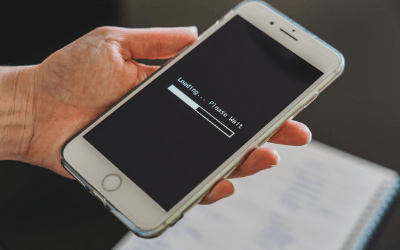8 Things that Might be Slowing Down Your Wi-Fi as a Student
09 April 2021 • 5 min read
Slow Wi-Fi is the bane of student life. Here's how to speed up your connection 👇
We rely on the internet for just about everything, so when your Wi-Fi is slow, it can really try your patience! If you’re looking for quick solutions for how to speed up your internet, you’ve come to the right place. We’ve put together a quick guide to figuring out what’s causing your slow Wi-Fi and how to fix it.
Ask your housemates 🏡
Living with other people is all about learning to cohabitate in harmony. Whether that means not using up all the hot water during your shower; replacing the toilet roll if you use the last of it up; or appreciating that you all may be using the internet at the same time. If you suspect that your housemates are taking part in bandwidth-heavy activities (like leaving a large download running or online gaming) you have a few options.
Plugging in an ethernet cable directly to your router will help you get higher speeds on your laptop, but obviously this isn’t possible for a phone or tablet. In this case, try letting your housemates know you need some more bandwidth!
Check your processes 👀
When you boot up your laptop, how often do you check what processes are running in the background? Windows is notorious for running background updates that sap your bandwidth – so, before you go knocking on doors to discover who is the culprit for your slow WiFi, check your processes in Task Manager. You might be surprised to find a program is throttling your speeds without your knowledge!
Is your router in the best place? 📍
Everything from brick walls and heavy doors to microwaves and refrigerators can interfere with your connection. If your dodgy WiFi is a constant complaint, try moving your router. Wireless routers need open spaces away from walls and obstructions, so although it might be tempting to hide that ugly little box in a closet or behind some books, you’ll get better signal if it’s out in the open. This can usually give you a welcome boost in the signal across all devices. Just make sure you’re not moving it so far from your housemates’ rooms that they lose signal!
Your house is too big 🤷♀️
It’s definitely a first-world problem, but if you’re living in a bigger house, getting good signal in all corners of your home may be difficult. When your house is too big for a single router to guarantee fast broadband speeds in every room, it’s worth investing in a signal booster to get the most from your broadband.
Your phone is getting on a bit 📲
If you are wondering why the WiFi is slow on your phone, the device itself could be the problem. As apps update over time, the hardware requirements to run them gets higher. For example, if you try running the Amazon app on an old phone, you’ll find it’s much slower to load than on a new device.
If it’s over three years old, consider upgrading your phone to a new model on a cost-effective contract and say goodbye to slow-loading apps and Google searches that go nowhere.
Your computer has been infected 🦠
If you’re suffering from slow speeds but no one else in your house is having an issue, you might be dealing with malware. As well as excessive pop-ups and painfully slow download speeds, malware in action can consume a huge part of your computer’s memory, leaving limited resource for other programs to use. The good news is it’s fairly easy to remove malware.
Use your Task Manager or Activity Monitor to check which applications are working the hardest. Suspicious applications will be eating up the bandwidth like Pac-Man and power pellets – close out of activity monitor and delete the application. In future, make sure to update your operating system regularly, increase your browser security settings and avoid downloading software from dodgy websites.
You’ve got intruders 🙅♂️
It is entirely possible that your slow WiFi actually has nothing to do with obstructions by the router, bad positioning, housemates using up the bandwidth or even malware. If your network is open or vulnerable (e.g., the password is ‘password’), you could have an unwanted neighbour piggybacking on your connection. Even if you don’t mind in theory, WiFi intruders could access files you’re unknowingly sharing and even steal your passwords and personal information.
Depending on your internet provider, you might be able to find out who is using your WiFi through the router interface app. Otherwise, you can download a program that can show you a list of connected devices. Just make sure you’re downloading a legitimate app from a safe website!
You need to reboot your router 🙌
Just like computers, routers sometimes get overloaded and start running slowly. Most internet service providers recommending rebooting your router every couple of months. This is as simple as switching it off, unplugging it from the wall, waiting a minute and plugging it back in. Best case scenario, you fix your internet connectivity issues. And, if there’s no change, at least you’ve eliminated one possible issue!
Want to get your WiFi sorted for you while you study? Here's how going all inclusive might help you.




